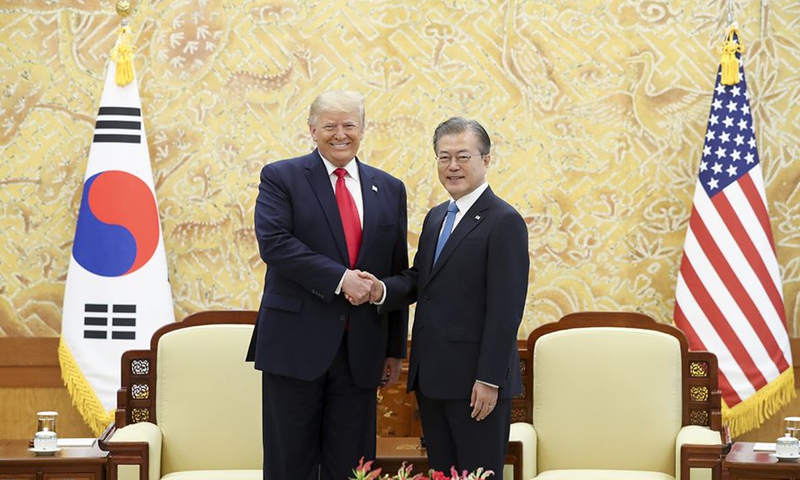South Korea flirtation with G7 expansion unwise
By Li Jiacheng Source:Global Times Published: 2020/6/7 11:56:20

South Korean President Moon Jae-in (R) meets with U.S. President Donald Trump in Seoul, South Korea, June 30, 2019. (Xinhua/South Korea Presidential Blue House)
As China-US conflicts intensify amid the novel coronavirus outbreak, US President Donald Trump's pullout from international affairs appeared to be accelerating.But he just did the opposite in terms of the G7. Instead of seeking to abolish this club of Western powers, he wants to invite South Korea, Australia, Russia, India and Brazil and expand the group.
South Korea and Australia are US' allies in the Indo-Pacific region. Russia used to be a member of the G8 group. India plays a pivotal role in the US Indo-Pacific Strategy too. The intent of expansion is to bring in more muscle to contain China.
Although South Korea is clear about Trump's motivation behind G7 expansion, the temptation to join is strong. South Korean President Moon Jae-in has told Trump that he would willingly accept the invitation to join this year's G7 summit, in the hope that his country can play a leadership role in virus control and economic recovery.
Moon also said he supports "a transition in the G7 system" and it is "an appropriate measure for South Korea, Australia, India, and Russia to be invited to take part in G7." He also discussed bringing in Brazil with Trump.
By wooing South Korea into his anti-China alliance, Trump wants to make the new group into a core mechanism to contain China.
As the US has the upper hand in the Seoul-Washington alliance, South Korea can only follow. It cannot refuse. Nonetheless, Seoul has always dreamed big. During the presidency of Roh Moo-hyun (2003-08), South Korea aimed to become the hub of Northeast Asia. By using this chance to be included in a major power club, South Korea wants to expand its own influence and lift its international status. It seeks to become a notable example that can strike a delicate balance between China and the US.
Given that Japan is already a member of the G7 and that trade frictions between Japan and South Korea are not resolved, Seoul can also use its participation in the G7 as lever to deal with Tokyo. Japan worries about seeing its position undermined with this inclusion and may not support it.
The G7 is already divided. Any semblance of G11 or G12 will face multiple divergences too. Today, the G7 is nearly paralyzed because of Trump's arbitrary behavior and ignorance of the other member states.
Trump's proposal to expand G7 at the very beginning met with strong opposition within the group. Canada and the UK object Russia's inclusion, while Germany and France do not trust Trump's leadership. As such they do not believe it is a platform where major wealthy (mostly Western) countries reconcile and cooperate, but instead feel Trump wants to use it as a tool for his "American First" policy.
German Chancellor Angela Merkel has turned down Trump's invitation to attend the G7 Summit in Washington DC in person, citing caution with the coronavirus pandemic. Russia has responded with coldness. Italy, a member of G7, also adopts a relatively China-friendly stance.
Therefore, this G11 or G12 is probably a publicity stunt that aims at creating an anti-China opinion sphere, but really will not have expected outcomes. South Korea bows to the US rashly and is choosing to pick the side of the US amid China-US conflicts. This is not a wise choice and will jeopardize China-South Korea relations.
The author is an associate professor of the School of International Studies, Liaoning University. opinion@globaltimes.com.cn
Posted in: ASIAN REVIEW